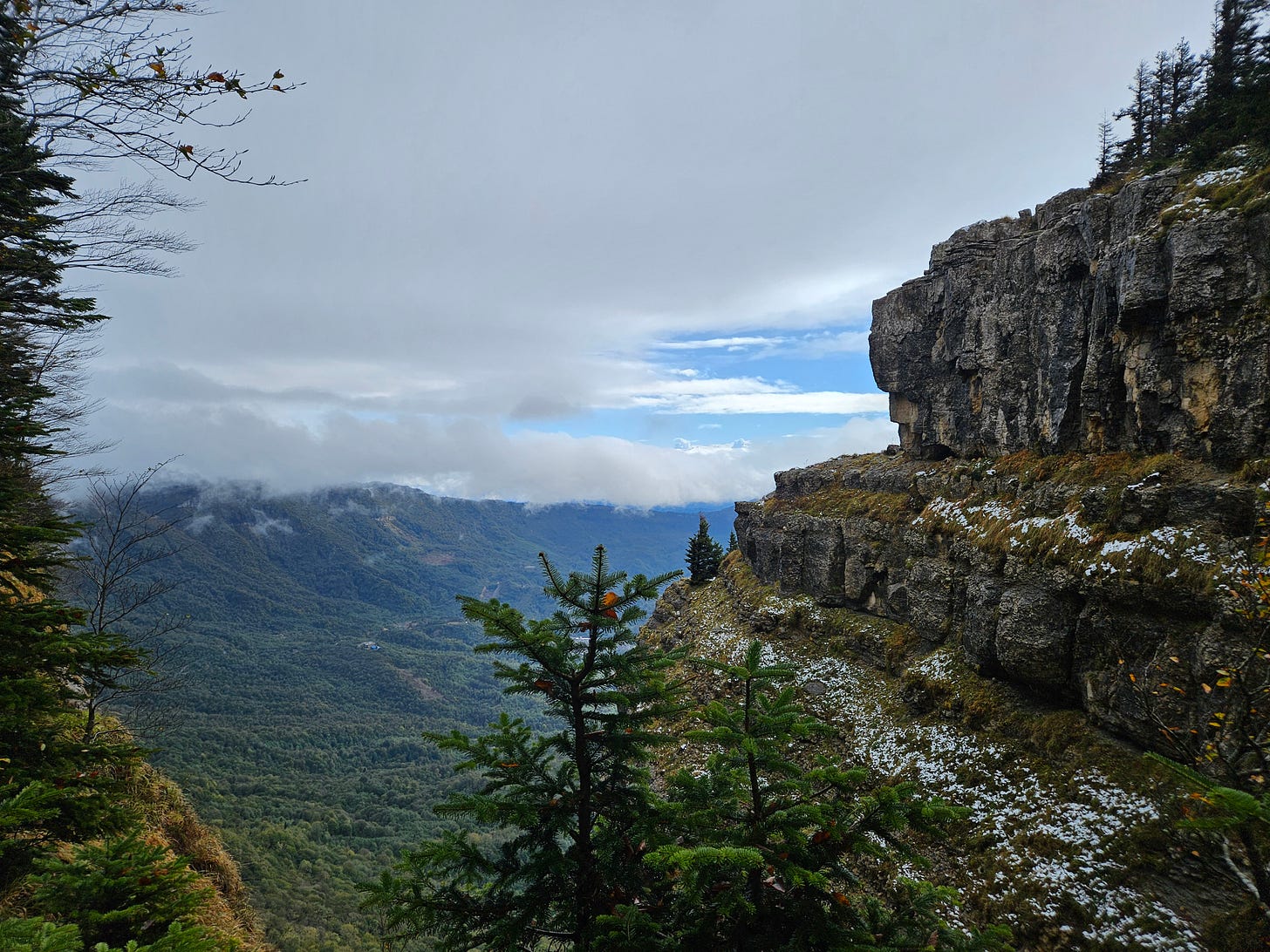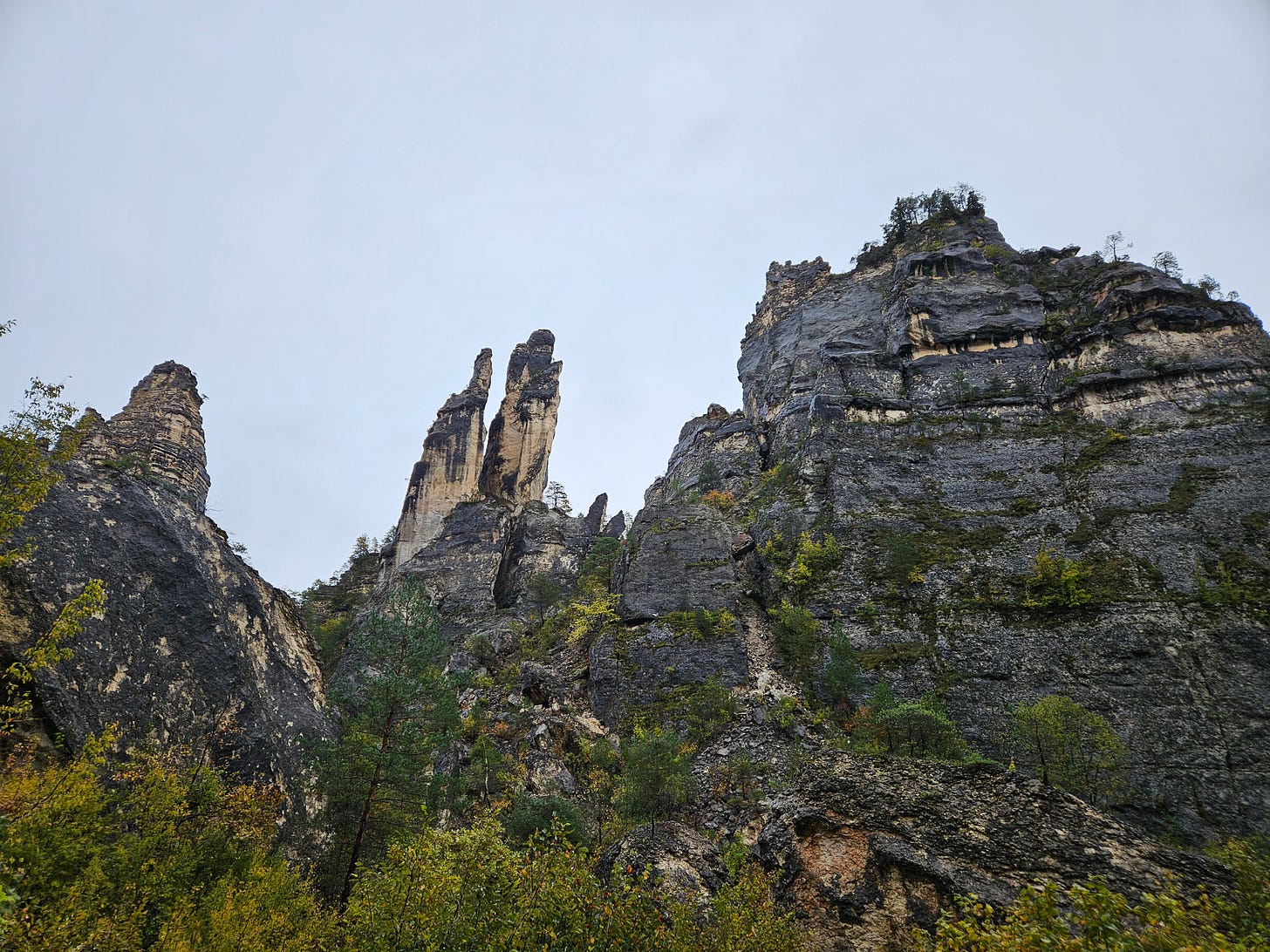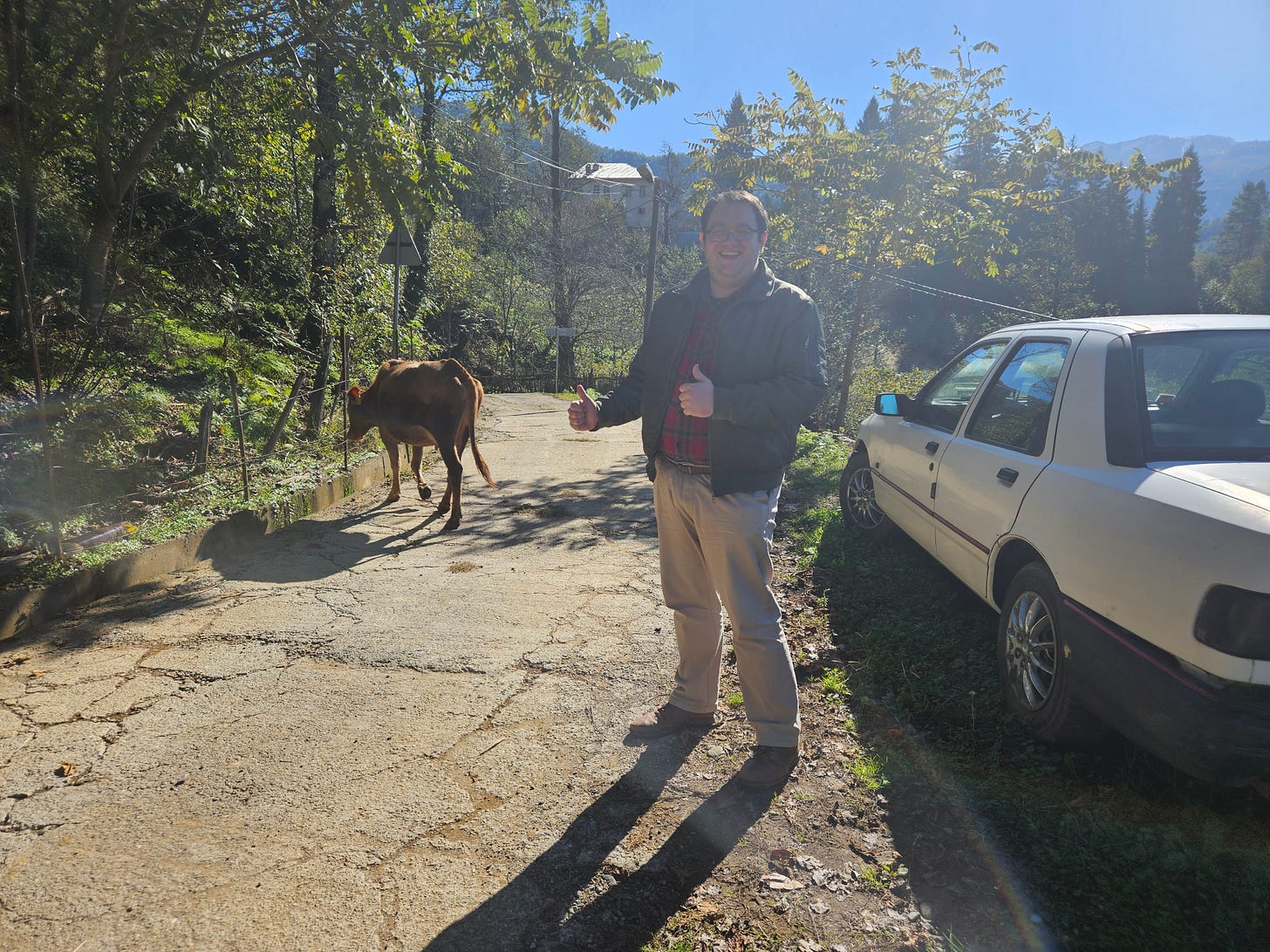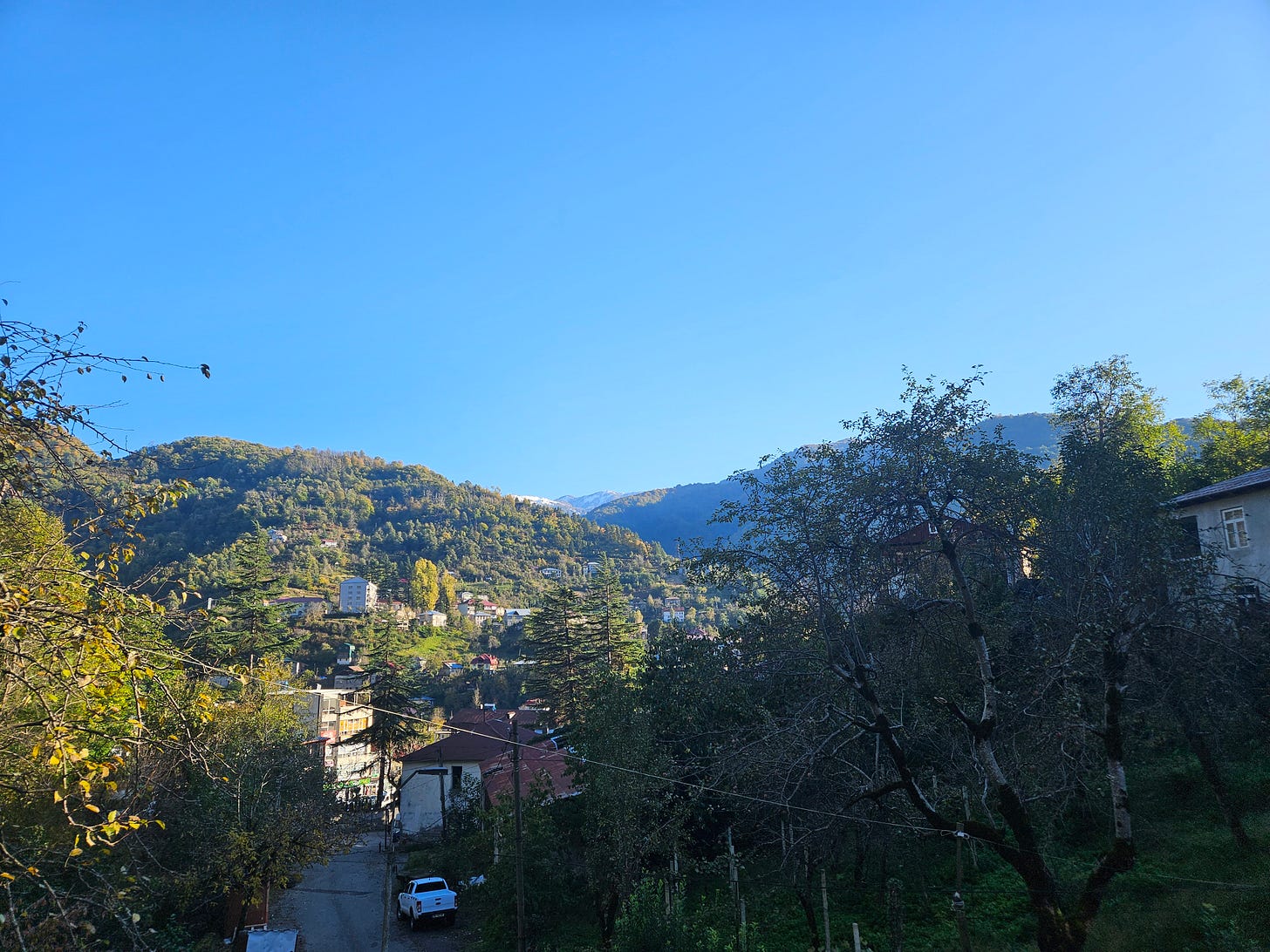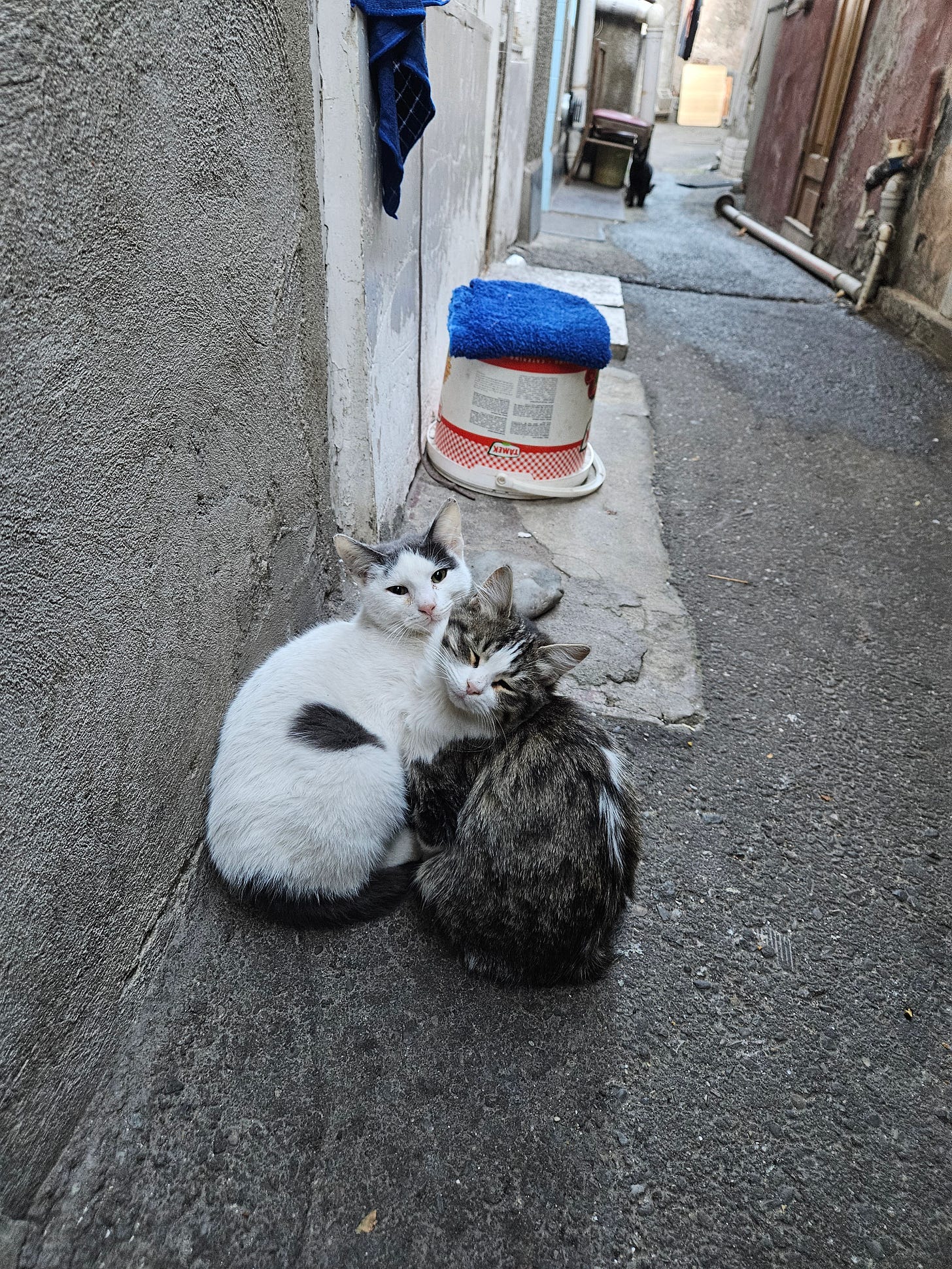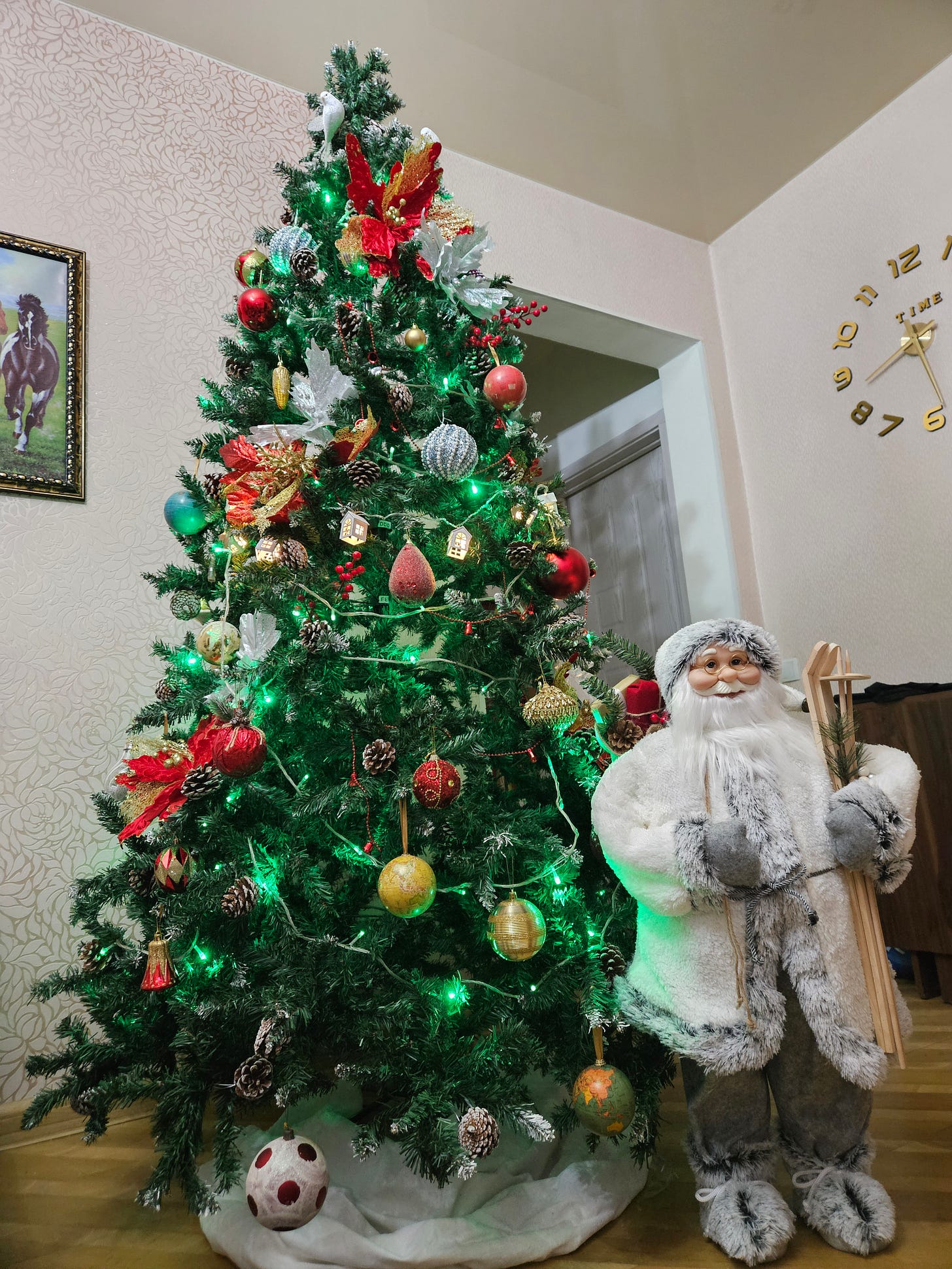A nightly ritual has emerged in my household since ზამთარი (zamtari/winter) set in: five hours before I go to bed, my host mom will remind me to turn on the space heater in my bedroom, as well as the electric blanket. Both are much needed. Despite the abundance of palms and sweltering summers, Upper Adjara is marked by frigid, wet, rainy, and snowy winters, at least further up into the highlands for the latter. This is the Lesser Caucasus Mountains, after all.
I’m from Upstate New York. I grew up in a place where cities competed for the coveted Golden Snowball Award, competing to see which city could be dubbed the snowiest (and it seems that this winter, per the folks back home, is arguably the harshest in roughly a decade). But I also grew up in a household that had insulation in the walls, where the furnace reached every room. Like many things, it’s a bit different here: insulation isn’t exactly commonplace, for example (I’m pretty sure my bedroom is wallpaper, then cinder block, then the outdoors). Traditionally, Georgian families would spend winter nights in a common area gathered around a ფეჩი (pechi/wood stove), but gas has made its way to the more rural locales of the country in recent years. My home only received a gas line about a month prior to my arrival, thereby relegating our ფეჩი to the basement. However, our heater wasn’t able to be installed until late autumn, which meant turning to our fireplace in the meantime.
While the heater gets very warm, it only has the range to really heat the living room. Some residual heat makes its way to the kitchen and two of the bedrooms, but not mine. Why, you might ask? Well, most of the house has been renovated, which means the installation of new windows. Most of the house, except for my room. Don’t take this for complaining: I like my room a lot, and I have the best view in the entire house. But I also have windows that are wooden-framed and…don’t exactly latch. They partially do, but they also leave a noticeable gap that results in my bedroom being at least 25 degrees colder than the rest of the house. Enter three heavy wool blankets, a space heater, and an electric blanket to boot. And even then, even with the donning of a hoodie or jacket on top of two layers of shirts…it’s still cold. Such is winter in Sakartvelo.
The rest of late autumn/early winter looked like this (incoming list of bullet points, and a deluge of photos from this period):
Headed to Racha-Lechkhumi to hike Tskhrajvari Mountain (literally Nine Crosses Mountain; can confirm there are nine crosses at the summit).
Discovered that hiking a mountain in the midst of snow, rain, and sleet is physically, mentally, and spiritually difficult: even more so when you learn that there are stairs that go to the summit, and we took the treacherous, mud-laden footpath that only the most devoted pilgrims utilize (RIP Hokas).
Visited Nikortsminda Cathedral, the Sairme Pillars, learned that Ambrolauri of all places has surprisingly good pizza, and enjoyed the taste of fine Rachuli vintage.
Had a photo shoot with my boss in one of the mountain villages when we visited our school’s one-room annex for teacher’s day celebrations.
Had even more photos taken with my boss and the wonderful team of educators that make up our school at the annual municipal teacher’s day ceremony (shout-out to my counterpart Natia for winning an award!)
Showed my students It’s the Great Pumpkin, Charlie Brown no less than 15 times. They were big fans of the special, particularly the “I got a rock” scene, but Snoopy’s conflict with Manfred von Richthofen was largely lost on them.
Stopped showing my students It’s the Great Pumpkin, Charlie Brown due to the local religious authorities opposing the open celebration of Halloween. I will argue until my last breath that Charles M. Schulz, a devout Christian, used the Great Pumpkin as a metaphor for putting aside denominational differences in favor of faith altogether, but this appeared to be a moot point.
Got sick/divinely punished for my screenings of the Peanuts gang.
Went to Tbilisi for language training, where I saw the Chronicles of Georgia and the Tbilisi Sea, haggled over old Soviet memorabilia at Dry Bridge, ate the most mediocre pizza of my life, and developed what I assume was bronchitis from the previous week’s illness.
Host dad and our neighbor jointly adopted a dog they’ve dubbed ლესი, or “Lesi” (I think it’s supposed to be Lassie but it’s too late to correct them now). In Georgian parlance, to adopt a dog basically means allowing it to sleep on the porch at night and feeding it food scraps.
Bronchitis seemingly cleared up (lol).
Pati, my host mom from training, came to Batumi for her students’ violin recital, so we spent the weekend together.
My tenth graders, who have learned of Thanksgiving via TikTok, were desperate to try gravy and begged to have my mom send me some (yes Mom, this is me calling you out regarding the gravy that was never sent, sorry).
Became the sickest I have ever experienced in my life out of nowhere.
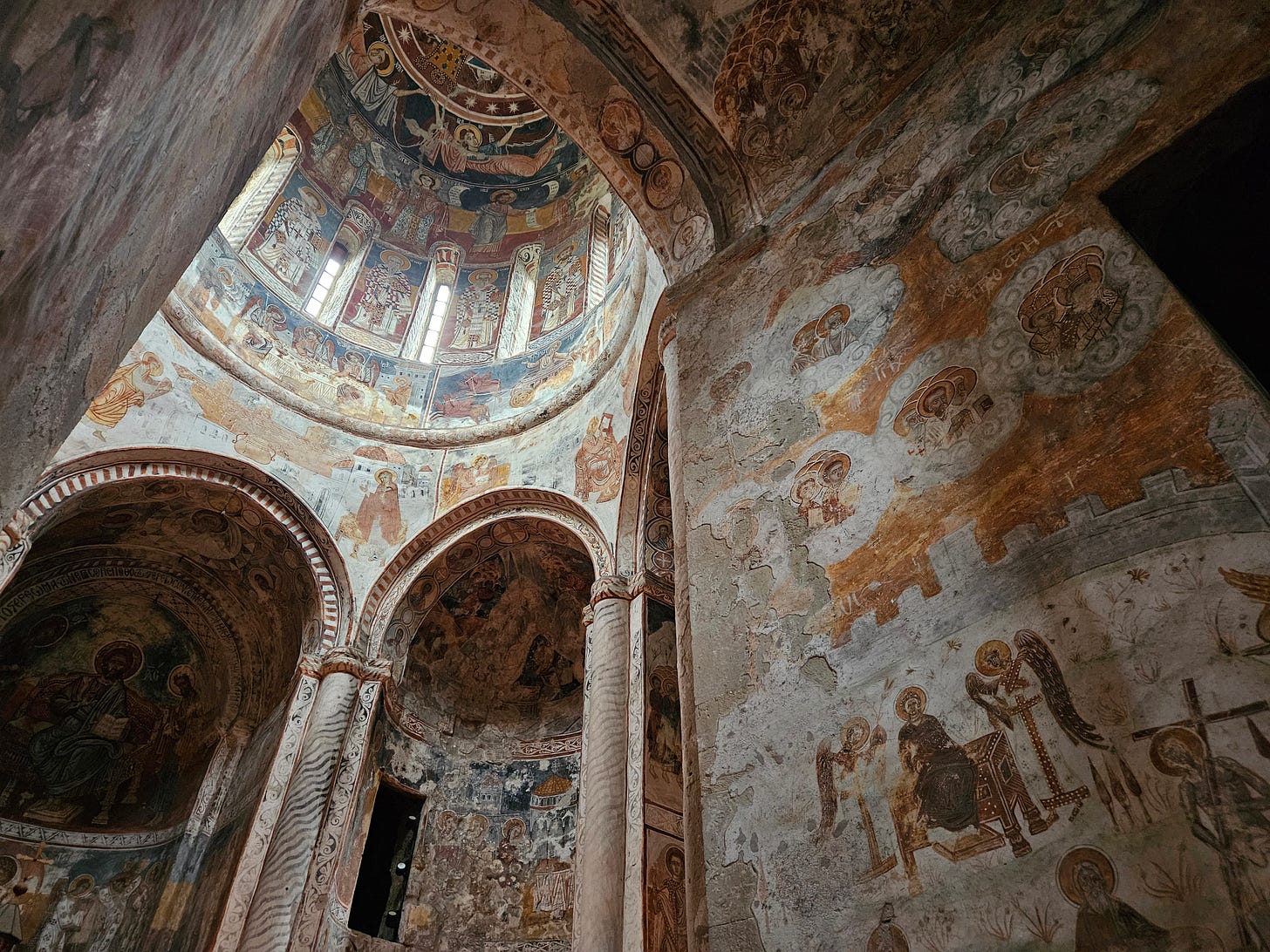
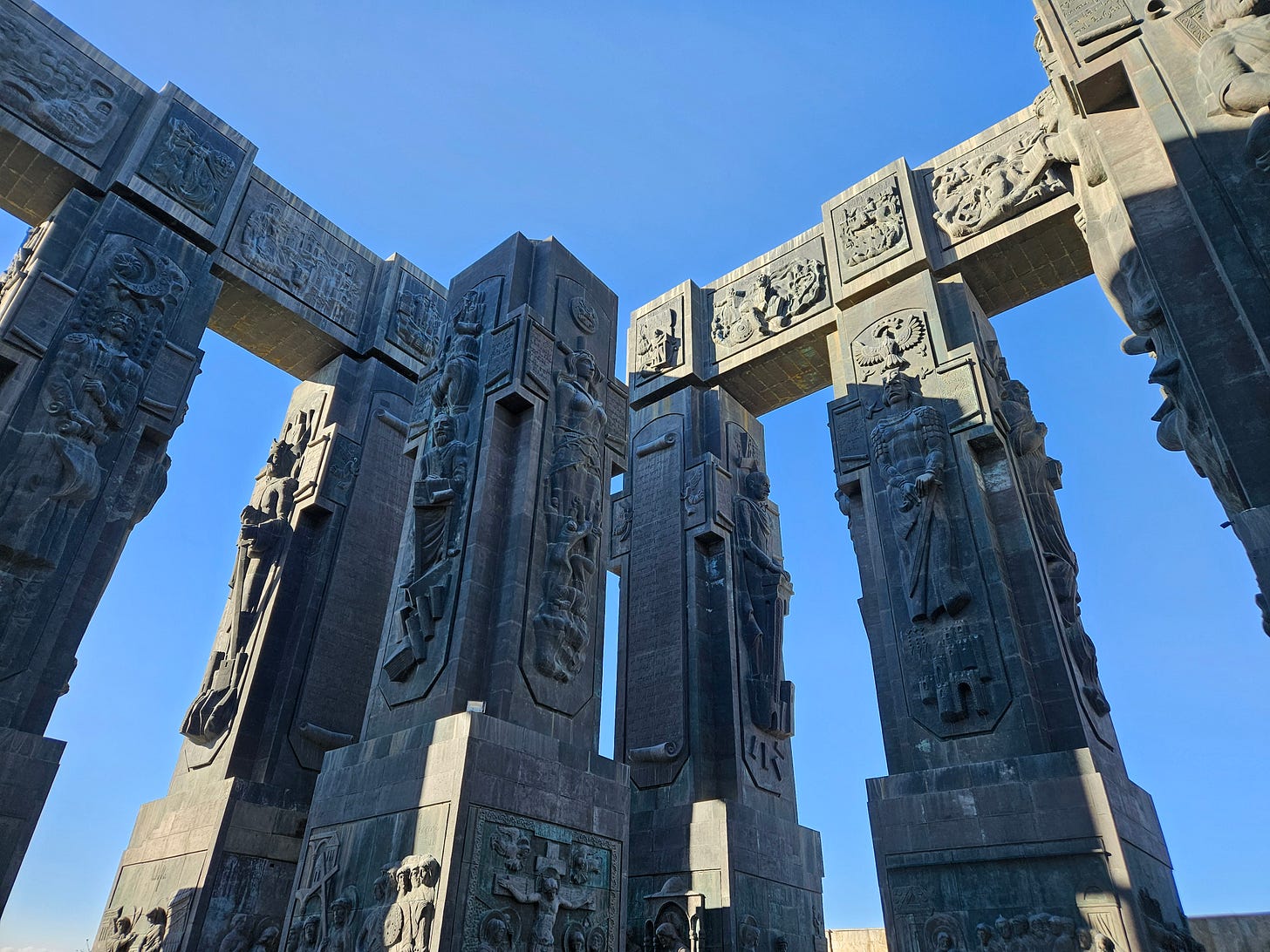
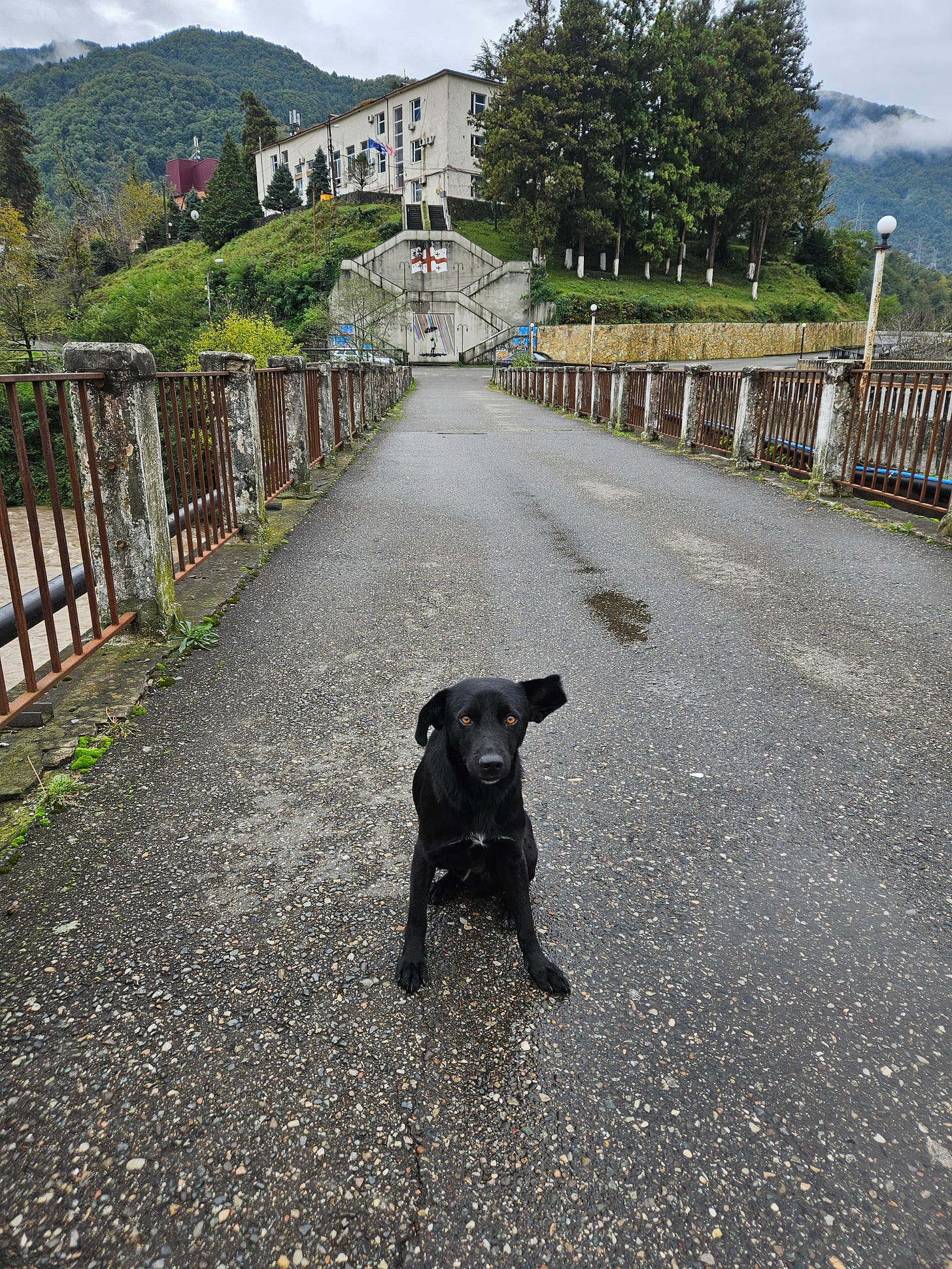
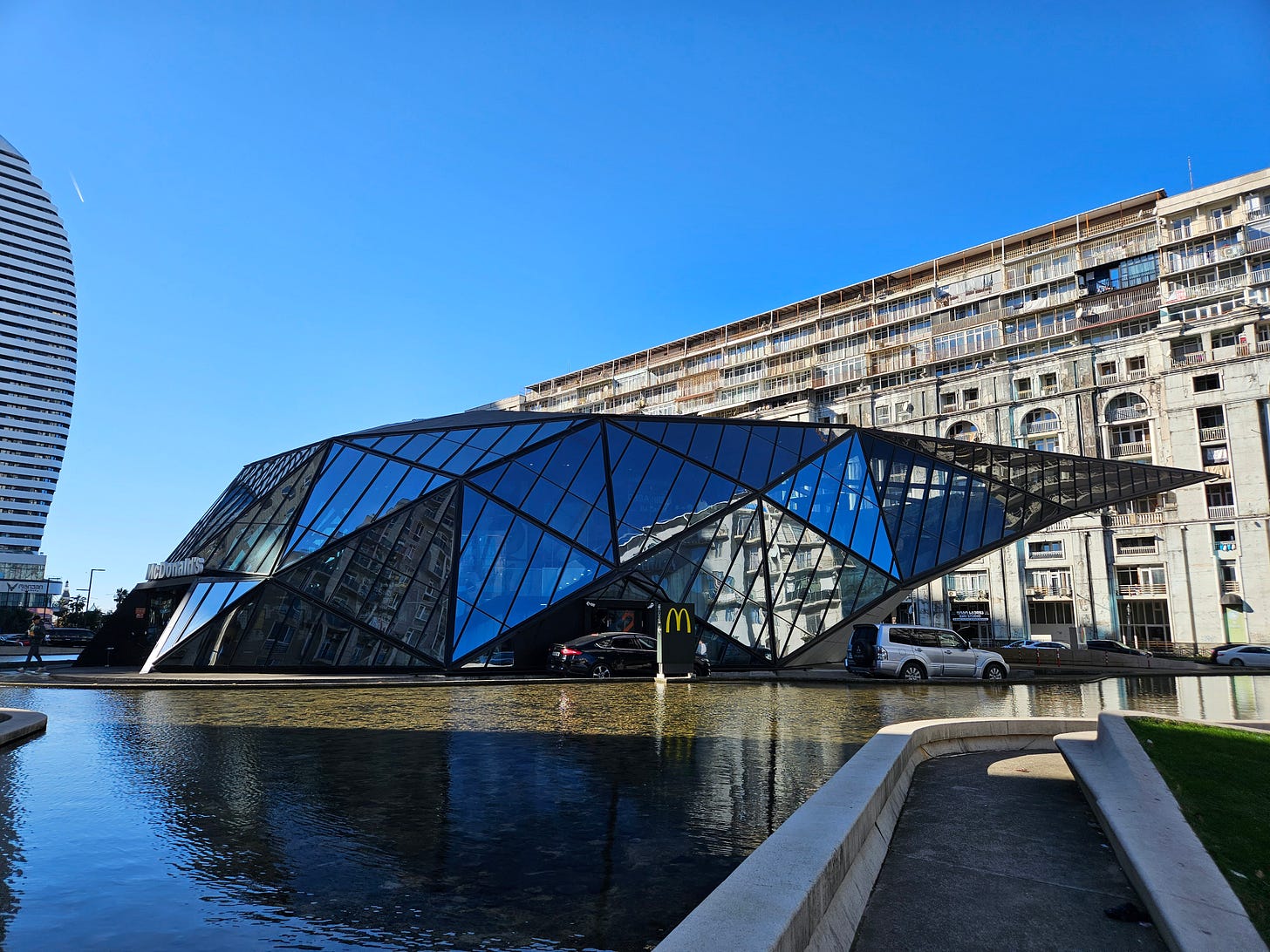
I cannot stress how rapidly this illness came about. What I assumed was bronchitis had largely faded away over a few weeks, and everything seemed normal. Until randomly, at around 7:30 in the evening one Wednesday night, I immediately felt feverish and pain in my chest while drinking coffee with my host parents and the neighbor. I went to bed, hoping that would subdue what I was feeling: I spent the night unable to lay in a position that didn’t feel like my lung was collapsing, fading in and out of feverish delusions that I somehow had acquired radiation poisoning (I blame this on watching HBO’s Chernobyl miniseries in the preceding days). The next day, a high fever, lots of coughing, a cardiovascular BPM that would rival a techno song, and an inability to have any appetite. And, according to my host mom, saying random Georgian words of varying intelligibility while delirious on the couch. Repeat ad nauseam for the next few days. At one point, my host mom called 112 (Europe’s equivalent of 911) and had paramedics come to the house to check me out (amazingly, this doesn’t result in a bill). By Sunday morning, however, I had had enough and opted to hire a taxi to take me to a hospital in Batumi.
I was taken to the X-ray room, its machinery from the Brezhnev era, and learned of my diagnosis: pneumonia. Not an absolutely abysmal case, but a case bad enough that warranted transfer by ambulance to Tbilisi. The fortunate thing about pneumonia is, as severe as it outwardly seems, that the introduction of fluids and antibiotics almost immediately reverses course of the infection. Within half an hour at the hospital in Batumi, I felt 75% better. By the time I arrived in Tbilisi that evening, I was almost back to normal. Two days later, aside from the occasional latent cough, I felt completely fine. But Peace Corps cannot be described as an organization devoid of risk aversion by any means, and I spent the next six days recovering in the hospital, reveling in boredom. At the very least, I was able to eat McDonald’s my first night in the hospital due to arriving after the kitchen’s closure (something I never thought I’d hear a doctor suggest), all while listening to the resonant sounds of vuvuzelas from the protests at the nearby university. Overall, a drab but surreal experience. I want to emphasize how grateful I am for everyone in taking care of me: my host parents, the doctors and nurses in Batumi and Tbilisi, and the Peace Corps medical team. Even in spite of language barriers (my medical vernacular has certainly improved following this experience), everyone truly did an exemplary job in their care.
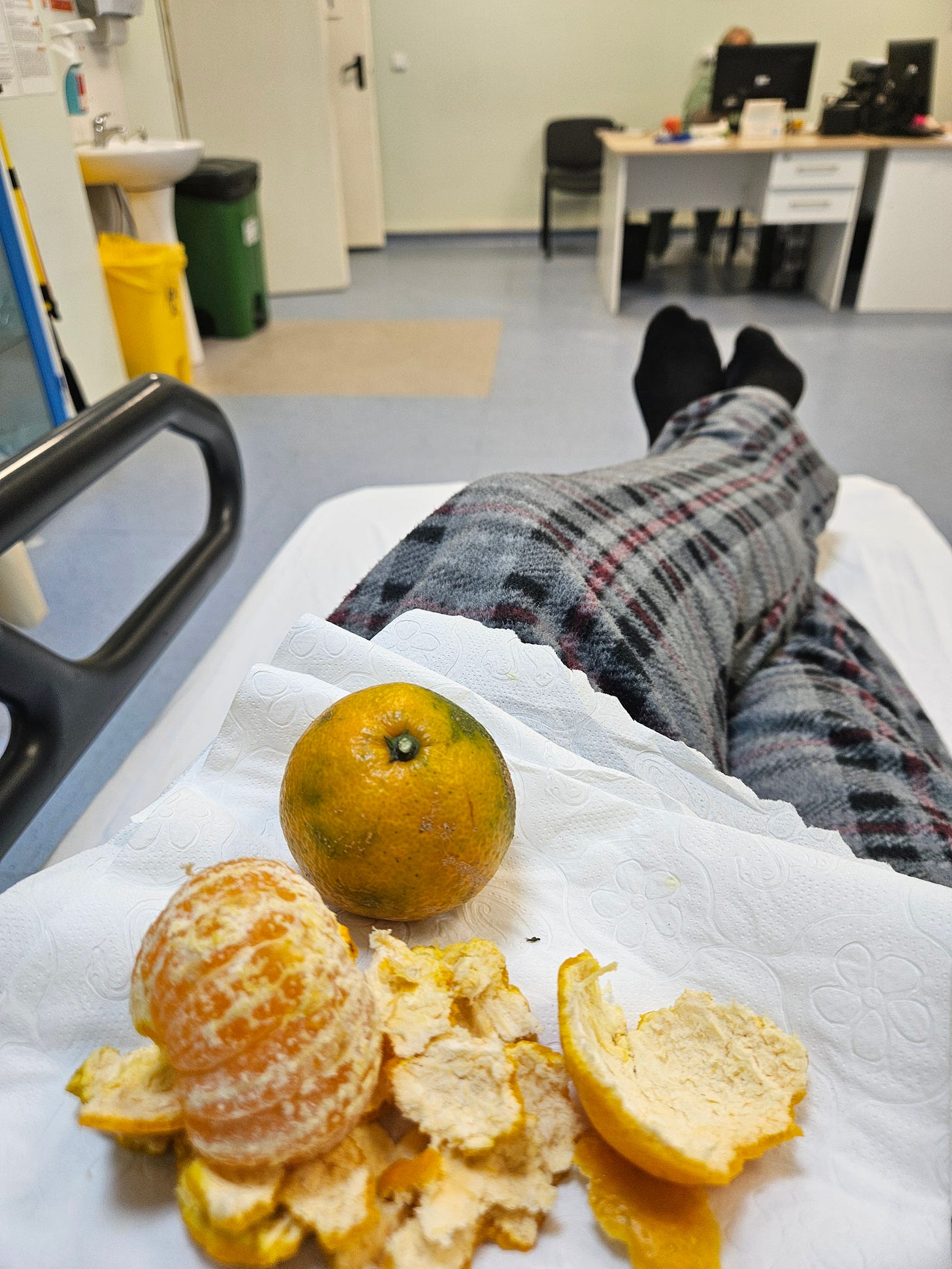
The return back to site meant some changes in the aftermath of this maybe-not-near-death-but-certainly-not-near-healthy experience:
A new, larger, more powerful space heater was requisitioned for my room (this one bears branding from Luxgen, a Taiwanese auto manufacturer; something tells me they were not involved in designing this).
My windows were repaired, i.e. had sealing tape applied to them and blankets draped from the curtain rods. My room is somewhat tolerable now in terms of temperature.
Host mom implemented a strict ban on my consumption of mineral water, as that’s what supposedly caused me to become sick in the first place. This is one of those cold beverages in winter = illness countries, and no amount of arguing otherwise worked in my favor.
For Christmas, my director bought me a pair of boots (my original hiking boots were unsalvageable according to the two intermediaries to the cobbler, apparently) and my deputy director and counterparts all chipped in to purchase me the heaviest winter coat known to man.
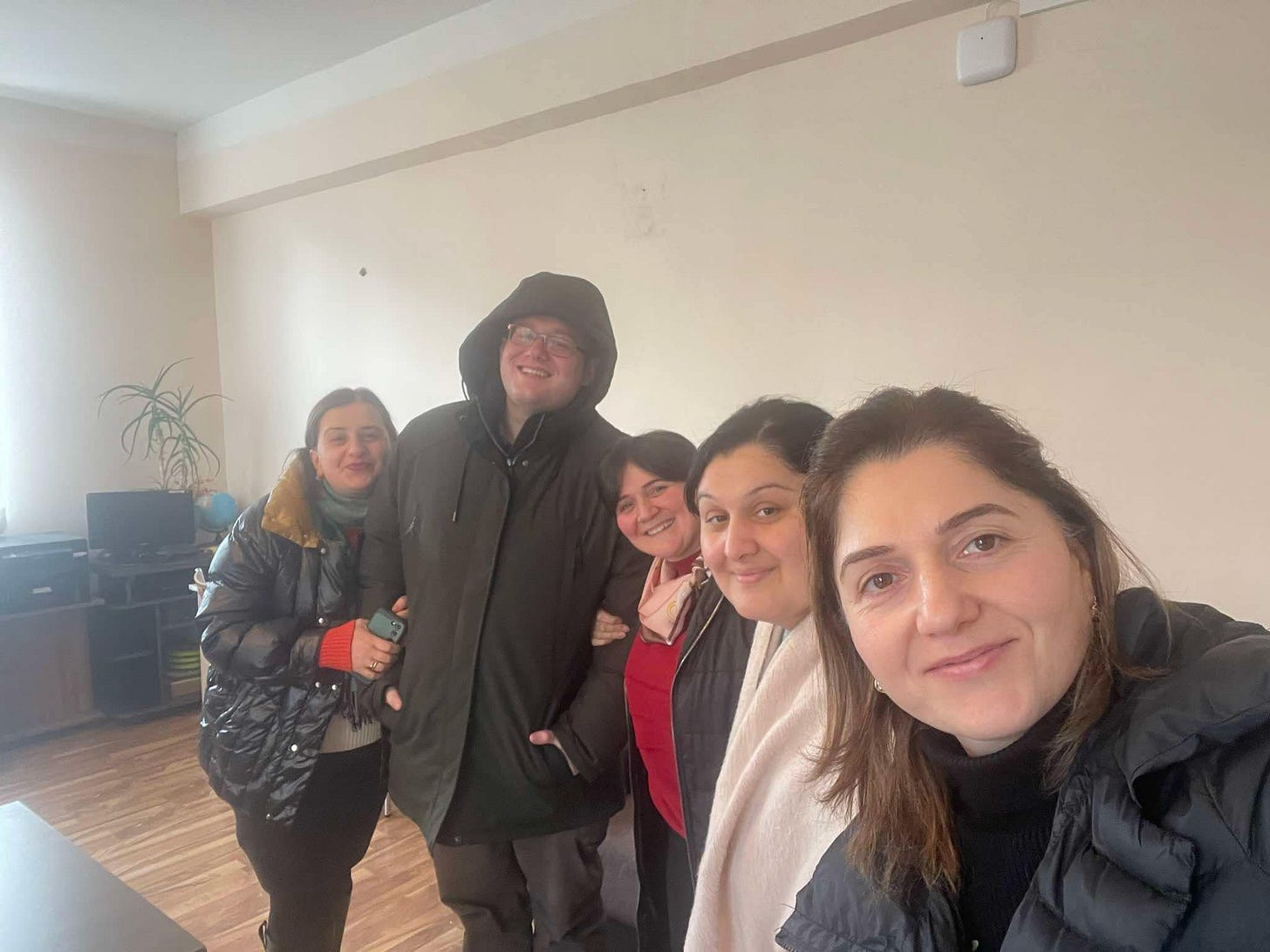
A saddening element of winter’s emergence is that my host mom started having to go to school earlier in order to cook breakfast for her second graders, many of whom don’t have reliable access to food at home this time of year. Like the US, income inequality is rampant throughout Georgia, and this is especially prevalent in rural areas. Although Adjara has the second-highest GDP amongst Georgian მხარე (mkhare/regions) after Tbilisi, much of this economic output is confined to Batumi. The COVID-19 pandemic has only heightened this gap, with the Institute of Development of Freedom of Information citing that between 2019 and 2021, the Autonomous Republic Adjara suffered the most out of the eleven mkhare and the capital. In this three-year span, the state agency responsible for social services deemed that the amount of people designated as socially vulnerable increased by 59%, resulting in over one-fifth of Adjarians receiving this classification. For some kids, their trip to school might be the only time where they have access to food that day, as unfortunate as it is.
But not only has the pandemic had significant impacts on the economic situation in Adjara: the weather, or rather trends of weather as a result of climate change, have too. The heavy snowfall combined with near-endless rain leads to a massive thaw in the spring, causing substantial erosion and thereby landslides. In February of last year, two Adjarians were killed by landslides, and each year a number of homes built on mountainsides are either destroyed or severely damaged by them. Last month, a landslide struck just outside my town on the main highway, leading to two days of road closures while crews worked to clear the debris (thankfully, nobody was injured). Ecological migration has been a major cause for concern since the 1980s, when numerous villages in Upper Adjara and Svaneti were essentially relocated throughout the country as a result of increasing earthquakes, avalanches, and landslides. Thousands of residents from Adjara’s highlands have settled in the so-called “Dream Town” (ოცნების ქალაქი/otsnebis kalaki). Located in a former Russian military base in the Batumi suburb of Khelvachauri, families began settling the abandoned fortification in 2012 in the wake of Georgian Dream’s victory in the parliamentary elections that year—hence the moniker. An estimated 3,000 families reside in the area, which—prior to the construction of permanent dwellings—consisted of homes literally constructed out of cardboard. While access to electricity and water has been afforded to the community in recent years, considerable challenges still remain. Construction began on apartment blocks for families in Dream Town, slated to be completed by 2028, but a recent tragedy (purportedly caused by the construction project) led to the death of two small children just last weekend.
There’s no simple solution to rectifying this situation, certainly not amongst a single mere Peace Corps Volunteer: decades of environmental degradation and poverty can’t be solved without a concerted, concentrated effort by hundreds, if not thousands of people addressing the structural root of the problem. But I felt like this was something important to discuss in detail nonetheless: poverty in Adjara is an oft-neglected issue, not commonly talked about (especially in English-language resources). It’s largely overshadowed, if not literally, by the immense hotels and casinos that line the coast of the Black Sea. Part of why I specifically wanted to write about this was because of my own experiences in Georgia as a Peace Corps Volunteer, and how they’re fairly atypical of most Volunteers around the world. Georgia is often lovingly described by its Volunteers as a “Posh Corps” country: many amenities found at home in America can be found here in my host family’s house (washing machine, microwave, large LCD flat-screen TV) that Volunteers elsewhere would take for granted. Likewise, within an hour I can be at upscale boutiques or the exact same fast food restaurants that exist in my hometown. But even then, in terms of living a rather privileged lifestyle that isn’t the norm for most Volunteers worldwide, significant challenges and income inequality still are very much prevalent here.
But rather than end this post on a dour note, I thought I’d touch upon a happier aspect of the winter: the holidays. Being an Orthodox Christian country, Georgia doesn’t celebrate Christmas on December 25th, which is just another day. Rather, Christmas is celebrated on the 7th of January, but this is largely a religious holiday, without the same sort of secular traditions that Christmas in the West has taken on in the last century or so. New Year’s is more akin to our Christmas with gift-giving and a tree (the tree here isn’t for Christmas, but explicitly for New Year’s), except with the added addition of, well, general New Year’s celebrations.
New Year’s (ახალ წელი/akhal tseli) in Georgia can best be described as a week of endless feasting, endless libation, and a revolving door of guests/being a guest elsewhere. There’s the lead-up to the celebrations, which officially sort of kick off on our Christmas (at least in my town, as the tree was lit in the park on December 25th). Because of the blending of New Year’s and Christmas into a singular, week-long celebration, Christmas music is heard well past the start of January. If we’re being technical, it goes into the end of the second week of January, as there’s also Old New Year’s, which falls on the 14th. And while I find Wham!’s “Last Christmas” to be a fantastic song, I heard it more times in a three-week span than anybody should have to in their life. At any rate, my screenings of A Charlie Brown Christmas for the students didn’t arouse controversy, so I’m happy about that.
New Year’s Eve included three separate dinners for each round of guests, with the largest occurring after the clock struck midnight (3pm for those reading this on the East Coast), which included a smorgasbord of soups, meats, cakes, and of course, lots and lots of wine. Accompanying this was the soundtrack of hundreds of fireworks being let off throughout the valley, something that continues around the clock until the conclusion of festivities on Christmas. The partying the previous night didn’t leave any room for rest on New Year’s Day: this was our turn to make it over to the neighbors, to friends and family in the community, and to my boss’ home. As was the next day. And in between all of these meals, there were still calls of ჭამე! (chame/eat) and დალიე! (dalie/drink) while sitting at home. My cup truly runneth over. It was fun, though, and definitely outshines any New Year’s celebrations in America.
I can’t touch at all on Orthodox Christmas, as I had left town on January 3rd (which truthfully might have been for the best, as three days of Georgian New Years celebrations on the inexperienced American body takes its toll). As for where I ended up, you’ll have to wait and see.
For your consideration:
Disclaimer: All views expressed in this post and on this blog are my own, and do not necessarily reflect the opinions of the Peace Corps, Peace Corps Georgia, the United States Government, or Georgia.




